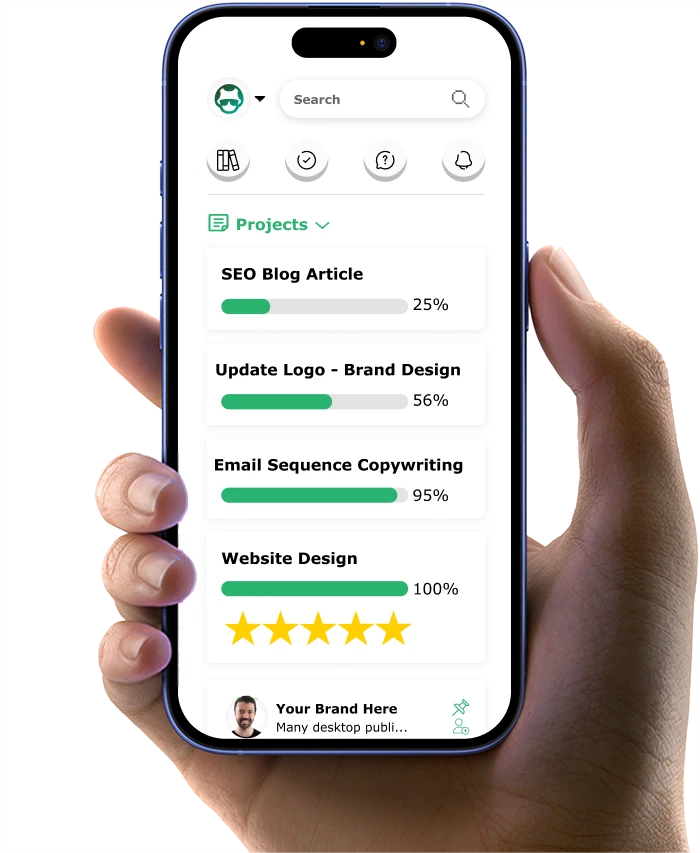7 Valuable Questions To Ask About Your Content Marketing Strategy

For a lot of small business owners, content marketing is an afterthought.
Understandably, with limited budgets and being busy with running a business, creating content isn’t exactly the top priority.
Because of this lackadaisical approach, these businesses aren’t coming anywhere close to their sales potential.
With an effective content marketing strategy, you basically turn your brand into a customer-generating magnet.
In fact, it’s one of the top ways people discover a brand.
But before you start tweaking your plans, I want to tell you about:
- 7 questions to ask about your content marketing strategy.
- How you can use these questions to create content that your customers will love.
- Some approaches to content marketing that you may have not explored yet.
It’s time to get objective about your content marketing strategy. No more sitting back and hoping for the best.
So let’s get into the first question to ask about your content approach…
In a rush? Want to download this article as a PDF so you can easily take action on it later? Click here to download this article as a PDF guide.
Question #1 To Ask About Your Content Marketing Strategy: Who Is My Target Audience?
Without knowing who you’re selling to, you’re going to have a rough time.
Before you even begin creating content, you must define your target audience.
Because you want to hone in on a specific set of consumers instead of casting a wide net on everyone.
You want to look at demographics like:
- Age
- Gender
- Income
- Location
- Education
- Language
Of course, the demographic profile of your target audience doesn’t tell the whole story.
You also want to understand their psychographic and behavioral profiles.
In other words, what are their interests, hobbies, attitudes, and habits?
And if you’re a B2B company, you’ll need to think of firmographic factors, such as industry, company size, seniority level, and integrations.
Once you understand your target audience on a deeper level, you can deliver content that’s highly relevant to them.
Now, you might already have a good idea of who your target audience is based solely on what you’re selling. For example, if you sell really expensive suits, then you know your target audience consists largely of middle-aged men with high incomes.
But it’s not always that straightforward. And besides, wouldn’t you rather learn even more about your target audience anyway? I mean, in addition to their demographics?
In order to gather this information, start your research process with your existing customers. Send them surveys that ask them some questions about how they feel about your product or service.
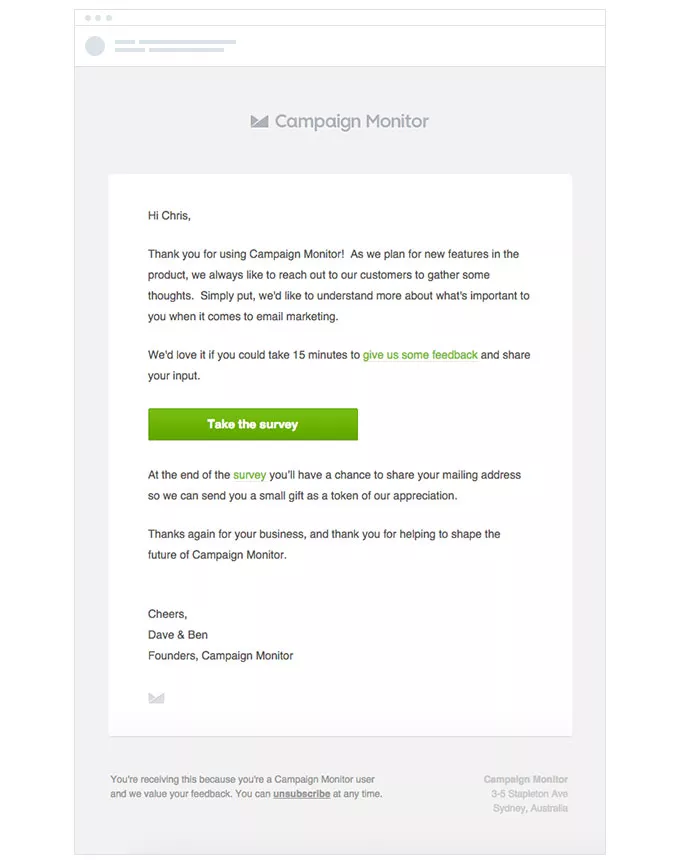
Besides running surveys, you can also just take a look at some findings already published from market research firms.
It’s very likely that there’s already been research conducted in your industry.
Another avenue to take is a competitive analysis.
Take a look at the social media profiles of your competitors and see how their followers engage with the brand. What kind of pain points do they commonly talk about? How do they talk? Are there types of posts that receive more engagement?
Oftentimes, you’ll find some patterns in consumer preferences that can help you come up with your next piece of content.
There’s a vast amount of information out there that’s just waiting for you to analyze. After your analysis, you’ll know exactly who your customers are and what kind of content will make them click.
Question #2 To Ask About Your Content Marketing Strategy: What Kind of Content Am I Going To Use?
If you ever read our article “19 Best Lead Magnet Examples To Help You Convert Leads Like Crazy,” then you know there are many types of content you can use.
At the bare minimum, you should have an email newsletter, which, according to Demand Metric, can increase your leads by 67%.
As you write great blog content, you’ll generate more website traffic — while also nurturing your existing leads.
Although a blog is effective, it shouldn’t be the only type of content you offer.
As I said, there are so many options.
Some other forms of content you can include in your strategy are:
- Checklists
- Guides
- Case studies
- E-books
- White papers
- Survey reports
- Templates
- Cheat sheets
The idea is, you just want to provide value. People like to learn new things. In some cases, like with a white paper report, it may even be required in order to survive in an industry.
And when you provide the answers someone is looking for, your brand becomes top of mind.
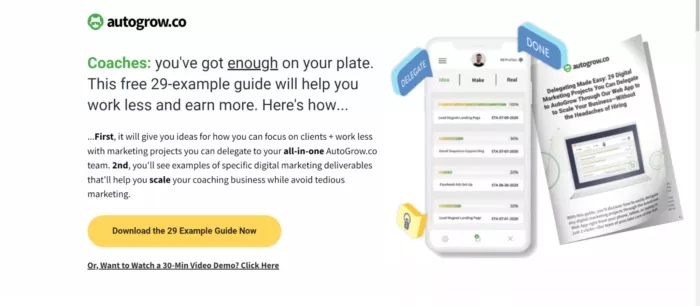
Question #3 To Ask About Your Content Marketing Strategy: How Are My Competitors Using Content?
You can get some inspiration for your content marketing strategy by simply looking at your competitors’ websites and seeing what kind of content they’re dishing out.
If you have an SEO tool like Ahrefs, you can even review their website and see which articles perform the best for them.
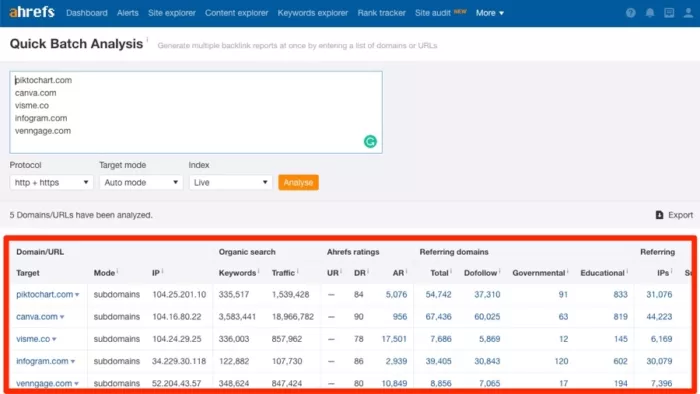
Once you identify the types of content that are generating the most traffic, you can do your own take with similar content. To get even more inspiration, take a look at the comments section of your competitors’ blog articles to see if there are subtopics your target audience is interested in.
By the way, as you browse a competitor’s website, take note of the resources they provide. You just may find that there are some ideas that you’ve overlooked for your own content marketing strategy.
Question #4 To Ask About Your Content Marketing Strategy: What Tools Will I Need?
Everything from publishing a blog article to designing infographics is only accomplished with the use of digital tools. In those two instances, I like to use WordPress and Canva.
But you’ll also need to:
- Check for spelling errors.
- Send content through an email client.
- Conduct keyword research.
- Create short videos and webinars.
- Track your results.
Luckily, there’s a ton of options when it comes to content marketing tools.
Some of them are free, but others might cost you some money.
Just choose whichever tools strike the right balance between your content needs and your marketing budget.
For the Growbo blog, we use tools like:
- Google Docs for a rough draft.
- Grammarly for spelling and grammar.
- Hemingway for ease of reading.
- Ahrefs for SEO.
- Google Analytics for tracking website traffic.
- Advanced Marketing Institute for headlines.
Question #5 To Ask About Your Content Marketing Strategy: What Channels Should I Use for Distribution and Promotion?
Finally finished turning your survey results into a PDF document loaded with charts and infographics?
Now it’s time to promote it. But where would you do that?
Well, if you were Tinyclues, a CRM technology company, you’d share a press release on BusinessWire.com — an attractive option for companies who are looking to spread word on their recent findings.
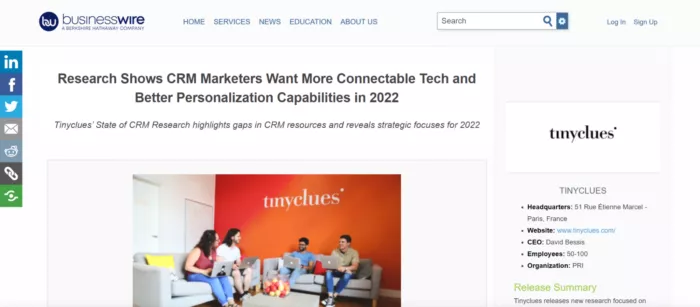
Besides Business Wire, there are other PR platforms, such as Presswire and Cision that allow you to promote your new reports.
But what if your content was a simple blog article?
You can share it on your social media channels and through email.
One heavily underutilized tactic for promoting blog content is backlinking. If you’re going to go this route, consider higher word counts. According to research from the aptly named Backlinko, long-form content receives 77.2% more backlinks than short-form content.
As for other types of content — like webinars, checklists, templates, etc. — you can promote them by linking to them in your blog posts, sharing them through your newsletter, using social media, setting up paid ads, and featuring a call to action on your homepage.
For example, Salesforce currently includes a customer case study front and center on its homepage.
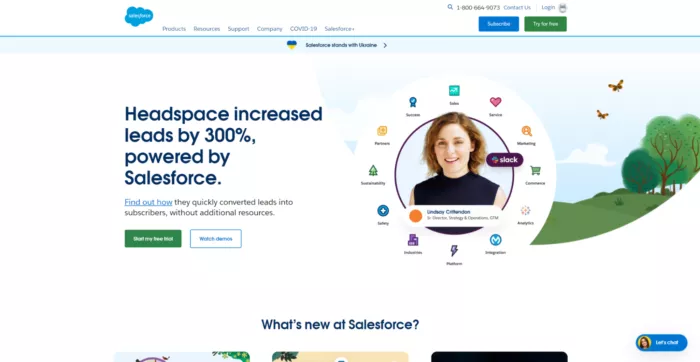
Question #6 To Ask About Your Content Marketing Strategy: How Does Content Help Me Achieve My Business Goals?
So you’re probably not creating content out of the goodness of your heart. No, rather, you obviously have a business agenda.
With good content, there are several different outcomes you could aim for.
For some content, you might be simply trying to build brand awareness. And other content could be a means for nurturing your leads.
But in most cases, you create content to generate leads. To do that, you make your content gated — or require a user to exchange contact information for the piece of content.
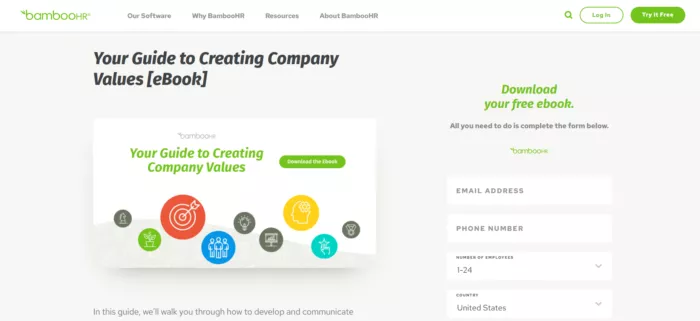
You can also use content for recruiting virtual employees.
How do you do that?
Well, you could show off your company culture in engaging ways — like writing an employee success story or collecting some short testimonials from your employees.
For example, at HubSpot, they have a culture code slideshow to let candidates know what the company values are like.

So, what do all these content goals have in common?
If it wasn’t obvious, your content has a direct influence on sales.
In order to get sales, you need people to know about your brand in the first place (brand awareness).
In order to get sales, you need to have some leads (gated content).
In order to get sales, you need to nurture those leads.
And of course, you need a talented staff to make your business run optimally.
Although all content leads back to your ultimate goal of more sales, you should assign a specific goal for each piece of content before development and promotion. This will allow you to fine-tune your content for each stage of the sales funnel — enhancing how relatable the content feels to the consumer.
Question #7 To Ask About Your Content Marketing Strategy: How Will I Measure Success?
Can you imagine playing a video game and not having any way to track your progress or results?
For example, if you played Call of Duty and couldn’t tell how many kills and deaths you have…
It would feel pointless.
Because it’s natural to want to see how good you are.
Just like with a video game, you’re going to have that instinct to track the results of your content marketing strategy. Plus, it’s just rewarding to see the fruits of your labor.
But even more important, measuring your success allows you to see what’s working and what’s not working. That way, you can double down on your strong points and revise, or possibly remove, your weak points.

Of course, you’re going to need some tools for this.
You’ll need to track metrics from your blog posts, email, social media, landing pages, video engagement, and maybe some other consumer touch points.
As an example, at Growbo, we track our top-performing blog articles in Google Analytics to inform us on what topics our readers are most interested in.
Over on ActiveCampaign, we look closely at email open rates, click-through rates, and conversions to give us an idea on which content gets the most engagement from our subscribers.
If we didn’t track our results, we wouldn’t have any way to know how to improve our content marketing strategy.
Conclusion
Download the “7 Valuable Questions To Ask About Your Content Marketing Strategy” so you won’t forget to take action on it later. Click here to download it now.
If you’re new to content marketing or if your strategy isn’t working, take a step back and take a deep breath.
Then when you gather your thoughts, ask yourself these questions:
- Who is my target audience?
- What kind of content am I going to use?
- How are my competitors using content?
- What tools will I need?
- What channels should I use for distribution and promotion?
- How does content help me achieve my business goals?
- How will I measure success?
When you can provide good answers to these questions, you’ll have a firm grasp on how to approach your content marketing strategy.
Better yet, it will get your creative juices flowing — forcing you to take a different perspective on your content. And that will only help you see your marketing objective come to fruition.
Understandably, trying to provide answers for all these questions is tough enough on its own. But that’s actually the easy part.
If you’ll need a hand implementing all your ideas and putting your creative juices into action, book a 1-on-1 consultation call with us at Growbo today.
Before you go, let me ask you something…
Which questions have you been forgetting about for your content marketing strategy?
Let me know in the comments below.
Keep Growin’, stay focused.



